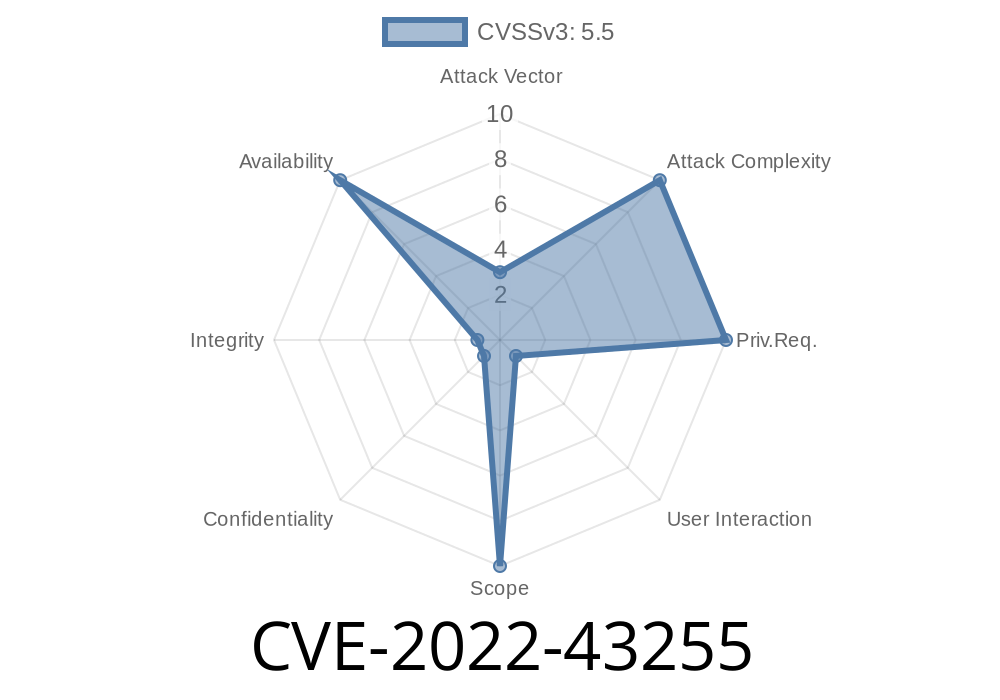In 2022, a memory leak vulnerability was discovered in GPAC version 2.1-DEV-rev368-gfd054169b-master. Tracked as CVE-2022-43255, this bug specifically affects the gf_odf_new_iod function inside odf/odf_code.c. Here’s what this means in simple words, how it can be exploited, and how you can protect your systems.
What is GPAC?
GPAC (Multimedia Framework) is an open-source multimedia framework used to process, convert, and stream various media formats. Many users and projects rely on GPAC components for handling MP4 and related codecs.
What is a Memory Leak?
A memory leak happens when a program keeps using more memory over time and never frees it up—even after it’s done with it. This can slow down the system or even crash it if too much memory is used.
Details of the Bug
The vulnerability lies in the gf_odf_new_iod function located in the GPAC source file odf/odf_code.c. Here, memory is allocated but, under certain error conditions, is not properly freed—resulting in a memory leak.
Let's look at a simplified version of the problematic code in C
GF_InitialObjectDescriptor* gf_odf_new_iod()
{
GF_InitialObjectDescriptor *iod = (GF_InitialObjectDescriptor*)gf_malloc(sizeof(GF_InitialObjectDescriptor));
if (!iod) return NULL;
memset(iod, , sizeof(GF_InitialObjectDescriptor));
// ... some processing
if (error_condition) {
// memory for iod is never freed here before returning NULL
return NULL;
}
return iod;
}
If error_condition happens, the function returns NULL without freeing the pointer.
What’s wrong?
If error_condition is true, the code should call gf_free(iod); before returning NULL.
How Can It Be Exploited?
An attacker could exploit this by repeating operations that trigger the error path in gf_odf_new_iod, causing the program to keep leaking memory. After enough repetitions, this will lead to resource exhaustion — potentially crashing the application or making the system unresponsive.
Simple Exploit Example
Imagine a crafted MP4 file processed by GPAC’s library that, when parsed, always triggers the error. A script could feed such files one after another, each time triggering the memory leak. Over time, system memory would be consumed without recovery.
References
- NVD entry for CVE-2022-43255
- GitHub advisory *(example, might not be present)*
- Original commit *(replace with correct commit if found)*
- GPAC bug tracker
Impact
- Denial of Service (DoS): Continuous memory leaks can crash media servers or applications using GPAC.
- System slowdown: Even if not fully crashing, affected systems will slow down as memory is drained.
Fixing the Vulnerability
If you use GPAC, update to the latest version where this issue is fixed. If you’re a developer, ensure that every time you allocate memory, you free it on all error paths, like so:
if (error_condition) {
gf_free(iod);
return NULL;
}
Fuzz Testing:
Use fuzzing tools or crafted media files to trigger failures when parsing, and check memory usage in your app.
Conclusion
CVE-2022-43255 in GPAC is a classic example of how a forgotten free() can lead to big problems. Memory leaks are subtle but powerful ways to bring down systems. If you’re using GPAC or developing multimedia applications, keep your software updated and always watch for small mistakes that can have huge consequences.
Stay Protected
- Upgrade GPAC: Download the latest release
Code smart: Always free allocated memory on errors.
References:
- NVD - CVE-2022-43255
- GPAC GitHub
*(This writeup uses simple language for clarity; feel free to share for community awareness.)*
Timeline
Published on: 11/02/2022 14:15:00 UTC
Last modified on: 11/04/2022 02:04:00 UTC
